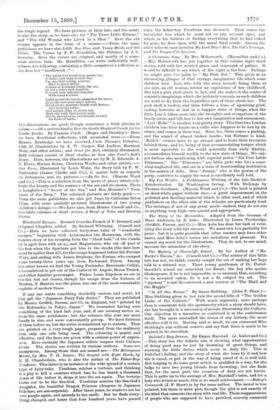Wonderful Escapes. Revised from the French of F. Bernard, and
Original Chapters added. By Richard Whiteing. (Cassell and Co.)—Here we have collected forty-four tales of "wonderful escapes," beginning with Aristomenes the Measenian, with the famous story of his escaping from the "black hole" of the CEeada (it is spelt here with an ce), and Hegistratus, who cut off part of his foot when the Spartans put him in the stocks (the date here must be earlier than 475, for the escape happened before the Persian War), and ending with James Stephens, the Fenian, who escaped some twenty-three years ago from Richmond Prison. Among the other heroes we find the Young Pretender, Benvenuto Cellini, who contrived to get out of the Castle of St. Angelo, Baron Trenek, and other familiar personages. Prince Louis Napoleon we see in the list, but not Orsini, though his escape from the fortress of Mantua, if Mantua was the place, was one of the moat remarkable exploits of modern times.
If any one wants something decidedly curious and novel, let him get the " Japanese Fairy-Tale Series." They are published by Messrs. Griffith, Farran, and Co. in England, but "printed by the Kobunsha, in Tokyo, Japan." We remember having seen something of the kind last year, and, if our memory serves us, from the same publishers ; but the volumes this year are more handy in size, and more conveniently got-up. We have thirteen of them before us, but the series is numbered up to sixteen. They are printed on a very tough paper, prepared from the mulberry tree, only one side being used. The colouring is quaint and effective, and the faces are given with a curious power of expres- sion. Here certainly the Japanese artists surpass their Chinese rivals. The stories are written by various authors. Some are anonymous. Among those that are named are The Matsuyama Mirror, by Mrs. T. H. James ; The Serpent with Eight Heads, by B. H. Chamberlain, who is also the author of The Fisher-Boy, Urashima. This latter is an instance of the wide spread of a certain type of fairy-tales. Urashima catches a tortoise, and thinking it a pity to kill a creature which has, he has heard, a thousand years of life before it, drops it into the sea again. The tortoise turns out to be the Sea-God. Urashima marries the Sea-God's daughter, the beautiful Dragon Princess (dragons, in Japanese folk-lore, are sea-serpents). After three years, he wants to see his own people again, and ascends to the earth. But he finds every- thing changed, and hears that four hundred years have passed
since the fisher-boy Urashima was drowned. Then comes the invariable box which he must not on any account open, and which, in his distress at finding everything that he had looked for gone, he does open, with the usual fatal result. Among the other tales we may mention My Lord Bag o' Rice, The Cat's Triumph, and The Tongue-Cut Sparrow.














































 Previous page
Previous page